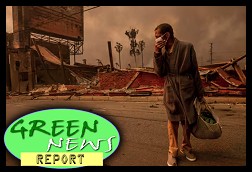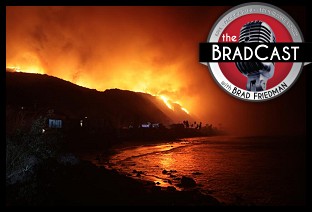 One item we weren't able to cover in today's Green News Report, but which should be noted here, comes from today's Washington Post...
One item we weren't able to cover in today's Green News Report, but which should be noted here, comes from today's Washington Post...
On Monday, BP said it spent $350 million in the first 20 days of the spill response, about $17.5 million a day. It has paid 295 of the 4,700 claims received, for a total of $3.5 million. By contrast, in the first quarter of the year, the London-based oil giant's profits averaged $93 million a day.
So that means, as Think Progress notes, so far the clean up costs for BP have amounted to a little less than four days of profits for them. "At $93 million a day in profits, BP makes $350 million in about 3.8 days."
It seems that recklessness for the fossil fuel industry remains a very safe business model for the time being.
In 1990, following the Exxon Valdez oil spill in Alaska, federal legislation was passed to make oil companies responsible for the cost of clean up from such disasters, and liable for up to (a paltry) $75 million in damages. While Congress is currently considering legislation to raise that cap from $75 million to $10 billion, there remains a question of whether or not such legislation would be retroactive to cover damages from the Gulf oil disaster or not.
If it does, as "the largest oil producer in the Gulf of Mexico," and one of "the world's five largest companies," according to WaPo, BP ought to be able to handle it.
Not that they ultimately will have to.
As both WaPo and TP remind us, thanks to a recent decision by the Bush Supreme Court, the "punitive damages against Exxon for the 1989 Exxon Valdez oil-tanker spill were originally set at $5 billion in 1994 but were reduced on appeal. The company agreed last year to pay less than $1 billion, including interest."
It's good to be king a corporate "person".
CORRECTION: Currently proposed federal legislation would raise the cap on damages to $10 billion, not $5 billion as we originally wrote above. The article has been edited to correct that error. By the way, even at $10 billion, says Daphne Wysham at Huffington Post today, the damage to property and to the fishing and tourism industries, as well as others, could eventually far exceed even that much. As Wysham notes in concurrence with the above: "Crime pays for BP."
 Reports of votes flipping on the 100% unverifiable ES&S iVotronic touch-screen voting machines used in Carroll County, Arkansas, have led to a call for removal of the machines. Who could have predicted it?
Reports of votes flipping on the 100% unverifiable ES&S iVotronic touch-screen voting machines used in Carroll County, Arkansas, have led to a call for removal of the machines. Who could have predicted it?

 Sunday 'Felonauguration' Toons
Sunday 'Felonauguration' Toons Fires, Liars and Oligarchs Rising as Biden Takes Final Bow, Issues Warning: 'BradCast' 1/16/25
Fires, Liars and Oligarchs Rising as Biden Takes Final Bow, Issues Warning: 'BradCast' 1/16/25 'Green News Report' 1/16/25
'Green News Report' 1/16/25
 Does Trump's Sentencing as a Felon Matter?: 'BradCast' 1/15/25
Does Trump's Sentencing as a Felon Matter?: 'BradCast' 1/15/25 Hegseth Faces Dem Fire in Contentious, Constrained Senate SecDef Nom Hearing: 'BradCast' 1/14/25
Hegseth Faces Dem Fire in Contentious, Constrained Senate SecDef Nom Hearing: 'BradCast' 1/14/25 'Green News Report' 1/14/25
'Green News Report' 1/14/25 Sunday 'City of Angeles' Toons
Sunday 'City of Angeles' Toons Ordered to Evacuate, But Now Home Safe: 'BradCast' 1/9/25
Ordered to Evacuate, But Now Home Safe: 'BradCast' 1/9/25 'Green News Report' 1/9/25
'Green News Report' 1/9/25 'A Tidal Wave of Fire' in L.A.:
'A Tidal Wave of Fire' in L.A.: Trouble in Trumpland? Broligarchs v. MAGA!: 'BradCast' 1/7/25
Trouble in Trumpland? Broligarchs v. MAGA!: 'BradCast' 1/7/25 2025 Kicks Off With Both a Bang and a Whimper: 'BradCast' 1/6/25
2025 Kicks Off With Both a Bang and a Whimper: 'BradCast' 1/6/25 Trump Gets Trumped in Our Musky Year-End Roundtable: 'BradCast' 12/19/24
Trump Gets Trumped in Our Musky Year-End Roundtable: 'BradCast' 12/19/24 About Some of Trump's 'Day One' Threats: 'BradCast' 12/18/24
About Some of Trump's 'Day One' Threats: 'BradCast' 12/18/24 Trump Corruption Cometh... So Does Our Opposition: 'BradCast' 12/17/24
Trump Corruption Cometh... So Does Our Opposition: 'BradCast' 12/17/24 Mistallied Contests Found in OH County, as Oligarchy Rises in D.C.: 'BradCast' 12/16
Mistallied Contests Found in OH County, as Oligarchy Rises in D.C.: 'BradCast' 12/16 Trump Admits He Can't Lower Grocery Prices (Biden Just Did): 'BradCast' 12/12/24
Trump Admits He Can't Lower Grocery Prices (Biden Just Did): 'BradCast' 12/12/24
 VA GOP VOTER REG FRAUDSTER OFF HOOK
VA GOP VOTER REG FRAUDSTER OFF HOOK Criminal GOP Voter Registration Fraud Probe Expanding in VA
Criminal GOP Voter Registration Fraud Probe Expanding in VA DOJ PROBE SOUGHT AFTER VA ARREST
DOJ PROBE SOUGHT AFTER VA ARREST Arrest in VA: GOP Voter Reg Scandal Widens
Arrest in VA: GOP Voter Reg Scandal Widens ALL TOGETHER: ROVE, SPROUL, KOCHS, RNC
ALL TOGETHER: ROVE, SPROUL, KOCHS, RNC LATimes: RNC's 'Fired' Sproul Working for Repubs in 'as Many as 30 States'
LATimes: RNC's 'Fired' Sproul Working for Repubs in 'as Many as 30 States' 'Fired' Sproul Group 'Cloned', Still Working for Republicans in At Least 10 States
'Fired' Sproul Group 'Cloned', Still Working for Republicans in At Least 10 States FINALLY: FOX ON GOP REG FRAUD SCANDAL
FINALLY: FOX ON GOP REG FRAUD SCANDAL COLORADO FOLLOWS FLORIDA WITH GOP CRIMINAL INVESTIGATION
COLORADO FOLLOWS FLORIDA WITH GOP CRIMINAL INVESTIGATION CRIMINAL PROBE LAUNCHED INTO GOP VOTER REGISTRATION FRAUD SCANDAL IN FL
CRIMINAL PROBE LAUNCHED INTO GOP VOTER REGISTRATION FRAUD SCANDAL IN FL Brad Breaks PA Photo ID & GOP Registration Fraud Scandal News on Hartmann TV
Brad Breaks PA Photo ID & GOP Registration Fraud Scandal News on Hartmann TV  CAUGHT ON TAPE: COORDINATED NATIONWIDE GOP VOTER REG SCAM
CAUGHT ON TAPE: COORDINATED NATIONWIDE GOP VOTER REG SCAM CRIMINAL ELECTION FRAUD COMPLAINT FILED AGAINST GOP 'FRAUD' FIRM
CRIMINAL ELECTION FRAUD COMPLAINT FILED AGAINST GOP 'FRAUD' FIRM RICK SCOTT GETS ROLLED IN GOP REGISTRATION FRAUD SCANDAL
RICK SCOTT GETS ROLLED IN GOP REGISTRATION FRAUD SCANDAL VIDEO: Brad Breaks GOP Reg Fraud Scandal on Hartmann TV
VIDEO: Brad Breaks GOP Reg Fraud Scandal on Hartmann TV RNC FIRES NATIONAL VOTER REGISTRATION FIRM FOR FRAUD
RNC FIRES NATIONAL VOTER REGISTRATION FIRM FOR FRAUD EXCLUSIVE: Intvw w/ FL Official Who First Discovered GOP Reg Fraud
EXCLUSIVE: Intvw w/ FL Official Who First Discovered GOP Reg Fraud GOP REGISTRATION FRAUD FOUND IN FL
GOP REGISTRATION FRAUD FOUND IN FL



















 It's been an ugly day at the polls in Kentucky, at least between supporters of the two highest profile candidates on the ballot today, in what's become a highly contentious race. Allegations of vote buying and intimidation have been coming out all morning in county after county.
It's been an ugly day at the polls in Kentucky, at least between supporters of the two highest profile candidates on the ballot today, in what's become a highly contentious race. Allegations of vote buying and intimidation have been coming out all morning in county after county.


 Tuesday's election are being called "Super Tuesday" by some in the media hoping to hype the four-state Election Day as a bellwether for the "anti-incumbency fever" predicted by the same media for this November.
Tuesday's election are being called "Super Tuesday" by some in the media hoping to hype the four-state Election Day as a bellwether for the "anti-incumbency fever" predicted by the same media for this November.

 An argument could be made that the greatest beneficiary of the BP oil disaster in the Gulf has been Massey Energy's CEO Don Blankenship. Until the Gulf Gusher took over the front pages, the serious heat, in both media and Congress, had been on Blankenship and the coal mine explosion which took the lives of 29 miners at Massey's Upper Big Branch Mine in West Virginia. Remember that?
An argument could be made that the greatest beneficiary of the BP oil disaster in the Gulf has been Massey Energy's CEO Don Blankenship. Until the Gulf Gusher took over the front pages, the serious heat, in both media and Congress, had been on Blankenship and the coal mine explosion which took the lives of 29 miners at Massey's Upper Big Branch Mine in West Virginia. Remember that? Eavesdrop on the phone calls of a U.S. citizen without court order? No.
Eavesdrop on the phone calls of a U.S. citizen without court order? No. The disputed upcoming special election in California's Senate District 15 may be on hold, at least for a day or two, as a federal district court has
The disputed upcoming special election in California's Senate District 15 may be on hold, at least for a day or two, as a federal district court has 
 It seems the corporate lobbyist/GOP strategy for opposing everything is now officially to charge: "It's a Government takeover of [fill in the blank]!!!"
It seems the corporate lobbyist/GOP strategy for opposing everything is now officially to charge: "It's a Government takeover of [fill in the blank]!!!" One item we weren't able to cover in
One item we weren't able to cover in 














